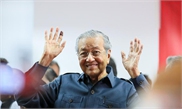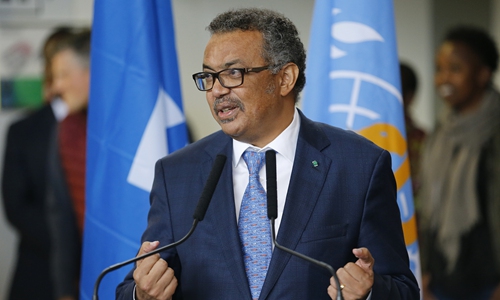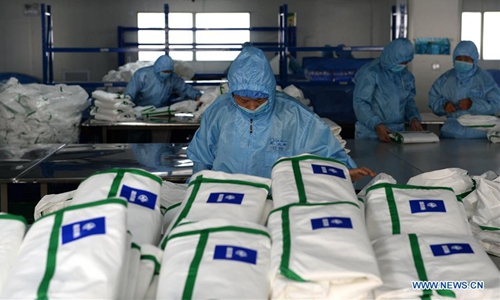PUTRAJAYA: Prime Minister Tan Sri Muhyiddin Yassin will be in charge of all ministries and government departments until the appointment of Cabinet ministers, says the latest Federal Government gazette.
The gazette signed on Tuesday by the Chief Secretary to the Government Datuk Seri Mohd Zuki Ali, also stated that the Yang di-Pertuan Agong, pursuant to Article 43 of the Federal Constitution, has appointed Muhyiddin as Prime Minister.
“This Order is deemed to have come into operation on March 1,2020, ” said the notice that was uploaded on the Attorney General’s Chambers website.
“It is notified that the Prime Minister, (Tan Sri) Muhyiddin (Yassin) shall be charged with the responsibility in respect of all departments of the Federal Government and the subjects for which the departments are responsible until the appointment of other ministers in the Cabinet.”
Muhyiddin, who was sworn in as Prime Minister on March 1, met chief secretaries from the Education and Foreign Ministries yesterday.
The newly minted Prime Minister posted pictures on Facebook of him meeting the duo in his office that featured empty shelves and empty tables, a sign of someone who has just moved in.
In the Facebook post, Muhyiddin said Education Ministry secretary-general Datuk Dr Mohd Gazali Abas briefed him on developments and suggestions to upgrade the education sector.
Foreign Ministry chief secretary Datuk Seri Muhammad Shahrul Ikram Yaakob was also seen explaining Malaysia’s current diplomatic relationships and pending international conferences.
“Mohd Gazali gave explanations on developments in the education sector as well as statistics of achievements, and gave suggestions on how to build up the education sector.
“Shahrul of the Foreign Affairs Ministry briefed the prime minister on the current relationship between Malaysia and other countries, as well as collaborations and important conferences which will take place this year, ” said the post.
It is believed that one of the main subjects discussed was the Asia-Pacific Economic Cooperation (Apec) inter-governmental forum that will be held in November in Kuala Lumpur.
The Cabinet list jigsaw puzzle
 |
| Muhyiddin Yassin |
GPS, having played the kingmaker in the political saga, expects to be well rewarded. Thus, drawing up the Cabinet list will be a more complicated task this time around, as there are just so many variables that need to be considered.
AS Prime Minister Tan Sri Muhyiddin Yassin thinks about the composition of his Cabinet list, he will certainly need to take heed as to how Sarawak should be rewarded.
There is no doubt that the 18 Members of Parliament from Gabungan Parti Sarawak (GPS) were the ones who made the critical difference in the numbers game last week.
The GPS consists of Parti Pesaka Bumiputera Bersatu (PBB), Sarawak United People’s Party (SUPP), Parti Rakyat Sarawak (PRS) and Progressive Democratic Party (PDP).
It was game over when these lawmakers chose Muhyiddin instead of Tun Dr Mahathir Mohamad to be prime minister.
Sarawak Chief Minister Datuk Patinggi Abang Johari Openg put it aptly when he told the media that “now you know the value of GPS votes.”
He said the ruling state coalition initially supported Dr Mahathir to continue leading the country.
“After that, he resigned. Then he resigned from Bersatu. After that, he was back again. So left, right, left, right, what else to expect?
“That’s why we supported Muhyiddin. At the same time, our Sarawak interest is uppermost, ” he added.
And the rest, as they say, is history.
Datuk Seri Anwar Ibrahim had hoped that GPS would remain neutral at least but the political reality was that GPS had to make a stand.
If there was one big factor that had made up the final decision of the GPS, it has to be the DAP.
Outspoken Deputy Chief Minister Tan Sri James Masing has consistently said that GPS would not support a coalition that included DAP in the ongoing political crisis.
He blamed DAP’s “administrative arrogance” for this, adding that the party did whatever it pleased without listening to others, citing Lim Guan Eng as an example.
He pointed out that the former Finance Minister had announced that Sarawak would go bankrupt within three years when the DAP leader came to the state last year.
The reality is actually the opposite.
In 2019, S&P Global Ratings has affirmed its ‘A-’ rating on Sarawak with stable earnings outlook and said the state’s exceptional budgetary performance and liquidity will likely mitigate its elevated debt, supporting its creditworthiness.
The state’s healthy financial standing and its stable socio-political environment have earned Sarawak commendable investment-grade credit ratings of A-, A3 and AAA by reputable international and domestic rating houses.
A Google search of the financial standing of the country’s largest state is sufficient to show that.
Lim’s hurtful remark, and other past disputes with the DAP, seem to have left a deep-rooted resentment of the party among GPS members, and last week, was payback time.
While it has been said that there are no permanent friends or foes in politics, this doesn’t seem to apply in the case of the GPS in this regard.
At one point, Masing even said the GPS was “more comfortable working with PAS than DAP.”
As the situation turned desperate, Sarawak DAP chief Chong Chieng Jen said the party was willing to make concessions with GPS to keep the Pakatan Harapan government intact, appealing to GPS “to put aside all past political differences and work together with Pakatan to save our country.”
Many interpreted the offer to mean the DAP’s readiness in not contesting in the upcoming Sarawak state elections.
But it came too late as the GPS had already made up its mind after having huddled together for two days at the Ritz Carlton hotel in Kuala Lumpur.
It remains to be seen what the GPS had asked for and what Muyhiddin has to offer.
It will be Sarawak’s gain over neighbouring Sabah as Chief Minister Datuk Seri Mohd Shafie Apdal opted to stay with Pakatan.
A statement from the Sarawak Chief Minister’s Office on Feb 29 said GPS supported Muhyiddin to restore political stability in the country without sacrificing Sarawak’s interest.
It also said that GPS would be friendly to the new Federal Government but was not a member of the Perikatan Nasional coalition.
Some senior leaders of the GPS said privately that they wanted to see what would be on the table but expected to be rewarded accordingly.
Others said that they were prepared to wait till the state elections were over – as these veteran politicians were aware that Pakatan would most certainly use the alliance with Perikatan Nasional as a rallying call against the GPS in the state polls.
Unlike Peninsular Malaysia, Sarawakian leaders are more interested in protecting and keeping their state positions rather than federal posts.
“The interest of Sarawak is more important than the interest of lawmakers, ” Masing told this writer.
But the immediate priority would be to demand a higher oil royalty from the current 5% and if this was a sticky point under Pakatan, it will likely remain so for the new Perikatan Nasional government.
The other is the Malaysia Agreement 1963, or more popularly known as MA63.
The agreement – an 18-point pact for Sarawak and 20-point for Sabah – was signed on July 9,1963, before the formation of Malaysia.
It is an important document safeguarding the rights and autonomy of the two states.
The 18-point and 20-point agreement covers religion, language, constitution, immigration, the position of the indigenous people, finance, tariffs and citizenship.
Sabahans and Sarawakians are understandably annoyed when they hear “orang Malaya” remark that these two states “joined Malaysia”, pointing out that they had, in fact, helped to form Malaysia.
In the peninsula, the governing state leaders are known as state executive councillors but over in Sabah and Sarawak, they are known as state ministers.
That also explains why Malaysians from the peninsula side need their identity card or passport when entering these two states, and state immigration have the right to deny anyone entry.
“Orang Semenanjung” who want to work in these two states have to apply for a work permit.
The same goes for lawyers who wish to appear in the courts of either state – they have to get approval beforehand.
Most Malaysians may not understand fully what MA63 is all about, even if they have become contentious political issues.
But most believe that the Federal Government has not given due recognition to the MA63 or that these safeguards have not been honoured or taken away.
Sarawakians want a greater degree of financial and political autonomy as compared to other states in the peninsula and not end up being merely one of the 13 states in Malaysia.
It remains to be seen how or what posts would be given to the GPS MPs, and whether this state coalition wishes to wait till the state polls are over before moving in but what is certain is that the new Prime Minister certainly cannot ignore the Land of the Hornbill.
Abang Jo’s words (now you know the value of the GPS) would surely ring continuously in the ears of the Prime Minister.
And now, this explains why a tiny country like Malaysia, with a population of over 32 million people, has a big Cabinet – it is simply because the Prime Minister has to accommodate so many geographical and ethnic interests.
It is also very possible that the Prime Minister may announce the appointments in batches, starting with the crucial ones. This will allow him time to tinker.
Drawing up the Cabinet list will be a more complicated task this time, unlike previously, as there are just so many variables that need to be considered.
Related posts:
Malaysian minority citizens being marginalized in Malaysia! We want leaders with calibre!












































































